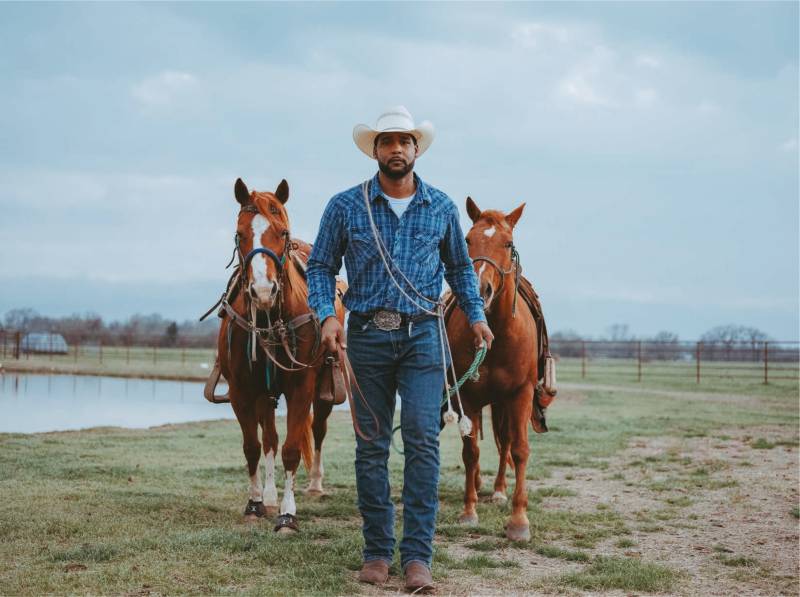As a child growing up in Kansas City, Ivan McClellan would sing the national anthem at the American Royal rodeo with a youth choir. Those performances are some of his fondest memories, but they’re also bittersweet.
A Photographer Documented Black Cowboys Across the U.S. for a New Book

That’s because just about everybody else around him was white.
“It wasn’t a place that we felt like we belonged,” McClellan told Morning Edition host A Martínez.
Learning about Black rodeos as an adult came as a revelation to him. McClellan spent nearly a decade documenting this unique culture all across the United States.

His forthcoming photobook, Eight Seconds: Black Rodeo Culture, out April 30, features highlights from that journey. The title refers to the minimum amount of time a rider has to stay on a horse or other livestock in order to register a score during a competition.
“All of this beauty and energy and environment just stuck to me,” McClellan said about his first encounter with a Black rodeo. “I saw thousands of Black cowboys and they were doing the Cupid Shuffle in the desert and they were cooking turkey legs. And there were Black folks dressed like traditional cowboys. There were also Black folks riding their horses in Jordans and women riding with their braids blowing behind them and their hands with long acrylic nails clutching the reins.”

That event, the Roy Leblanc Invitational Rodeo in Oklahoma, is one McClellan has come to dub “the Super Bowl of Black rodeos.” It is the oldest of its kind in the country.
He began posting his photographs of the event online. As his social media audience grew, McClellan was soon traveling the country in search of similar happenings.
“There are Black cowboys pretty much everywhere. I mean, there are Black cowboys here in Portland, Ore., where I live, which I think is the last place that I would have expected to find them,” said McClellan, who now runs his own rodeo.
“I went all the way to Oklahoma to realize that there were cowboys up the road from me who have been there for four generations … You’d be hard pressed to find a part of America where there wasn’t at least some some portion of this culture.”

It’s a narrative largely shunned by Hollywood and the broader mass culture, where the cowboy is consistently portrayed as a white male, be it John Wayne, Val Kilmer or on TV series like Bonanza (1959-73) and Gunsmoke (1955-75).
Up until a few years ago, “I really thought that term [cowboy] was a joke when applied to a Black person,” McClellan said.
In fact, the term was once a pejorative for African Americans working on ranches and farms, while white cowboys were known as “cowhands.”

But ultimately, cowboy became “a shorthand for our noblest ideals,” McClellan said. “A lot of these things our popular culture is hesitant to attribute to a Black person. So I think to have a cowboy rushing in, saving the day with a black face just didn’t jibe with the stories that Hollywood was trying to tell. I think it’s erasure. I think it’s at best, laziness, at worst, very intentional and malicious. But I’m excited to see that transforming before my eyes.”
Beyoncé’s recent country-influenced album Cowboy Carter is the latest iteration of that push for change in popular culture. Lil Nas X challenged the country genre in 2018 with his song “Old Town Road.” It became a viral hit after sparking widespread conversations about genre gatekeeping and Black musicians’ place within country culture.

“It was a perfect alley-oop. And Beyoncé is hanging on the rim right now,” said McClellan. “Beyoncé is not only revealing Black cowboy culture, but she’s transforming country music forever and tearing down genres in a way that that I don’t think has ever been done.”
For McClellan, there’s now one place where he keeps returning over and over.
“As far as cultural impact, there’s nothing like the Roy LeBlanc Invitational Rodeo,” he said. “On the second weekend in August at about 8 p.m. when the sun is going down, everything is gold and all the athletes are filing into the arena for the grand entry. And that is where I like to take photos more than anywhere else on the entire planet.”

The broadcast version of this story was produced by Lilly Quiroz. The digital version was edited by Obed Manuel.

